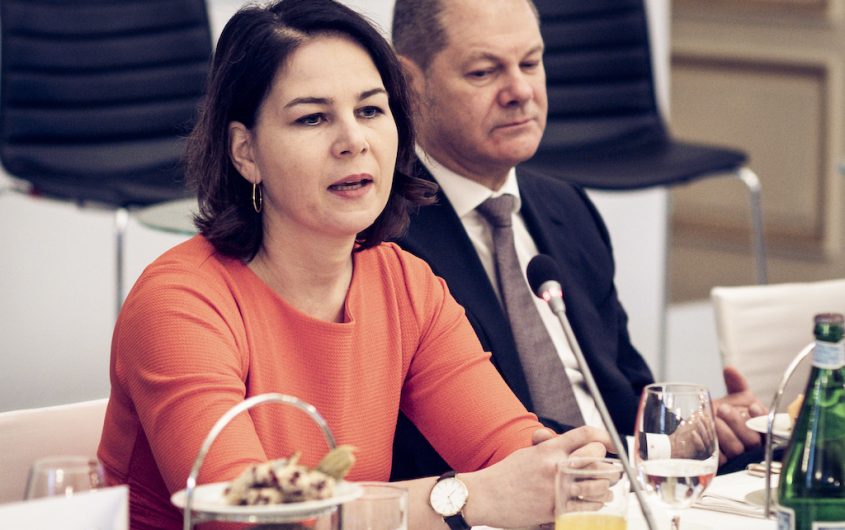
Annalena Baerbock speaks at AICGS side event at 2019 Munich Security Conference
Annalena Baerbock: The Greens’ Ambitious Bet that Germans Want Change and Renewal

Jeff Rathke
President of AGI
Jeffrey Rathke is the President of the American Institute for Contemporary German Studies at the Johns Hopkins University in Washington, DC.
Prior to joining AICGS, Jeff was a senior fellow and deputy director of the Europe Program at CSIS, where his work focused on transatlantic relations and U.S. security and defense policy. Jeff joined CSIS in 2015 from the State Department, after a 24-year career as a Foreign Service Officer, dedicated primarily to U.S. relations with Europe. He was director of the State Department Press Office from 2014 to 2015, briefing the State Department press corps and managing the Department's engagement with U.S. print and electronic media. Jeff led the political section of the U.S. Embassy in Kuala Lumpur from 2011 to 2014. Prior to that, he was deputy chief of staff to the NATO Secretary General in Brussels. He also served in Berlin as minister-counselor for political affairs (2006–2009), his second tour of duty in Germany. His Washington assignments have included deputy director of the Office of European Security and Political Affairs and duty officer in the White House Situation Room and State Department Operations Center.
Mr. Rathke was a Weinberg Fellow at Princeton University (2003–2004), winning the Master’s in Public Policy Prize. He also served at U.S. Embassies in Dublin, Moscow, and Riga, which he helped open after the collapse of the Soviet Union. Mr. Rathke has been awarded national honors by Estonia, Latvia, and Lithuania, as well as several State Department awards. He holds an M.P.P. degree from Princeton University and B.A. and B.S. degrees from Cornell University. He speaks German, Russian, and Latvian.
__
What might the Greens’ strength mean for the transatlantic relationship?
A great start is just a start, and there are five months to go until Germany’s September 26 Bundestag election. But the launch this week of the Green Party’s first chancellor candidate, the 40-year-old Annalena Baerbock, was a marvel. Tightly choreographed and smoothly produced, it was a broad-tent appeal to German voters, perfectly timed to capitalize on growing public dissatisfaction with Merkel’s Grand Coalition. Party strategists could not have predicted that the planned April 19 event would coincide with the climax of an internecine street fight for the top of the CDU/CSU ticket, but that fortuitous fact only heightened the contrast with their main opponent. As public opinion swings against the government’s vaccination and COVID-response measures, Baerbock’s most obvious vulnerability – her lack of executive experience – turned into one of the strongest lines of the speech: “I am advocating for renewal; for the status quo there are others.”
Baerbock’s debut as chancellor candidate was centered around an optimistic appeal to Germans’ confidence in the country’s ability to master the social, economic, and political challenges of the future: preserving Germany’s prosperity by ensuring its leadership in green industries, pushing digitalization forward, and expanding the social safety net. It was also an implicit rebuttal of many of the public perceptions that have dogged the Greens: as a niche urban-intellectual party, as a “prohibition” party, as an enemy of the economy. This is a culmination of many years of change in the Green Party, which Baerbock has helped spur, and the practical and successful state-level governance the Greens have demonstrated in places like industrial Baden-Württemberg, where Green Minister-President Winfried Kretschmann recently won re-election to a third term. The Greens are part of governing coalitions in eleven of sixteen states, equaling the number of both the CDU/CSU and the SPD, a further reminder of the mainstream success of the party.
The eroding public support of the CDU/CSU has put the Greens within shouting distance of first place in public opinion surveys (with one poll – which may be an outlier – having them at the top this week). For years, the Greens’ clear ambition to govern and their growing compatibility with Merkel’s CDU have made them an odds-on bet to be part of the next coalition; indeed, the only mathematically viable two-party coalition in recent polls would be a partnership of the CDU/CSU with the Greens. Baerbock’s strong opening, coinciding with the CDU/CSU’s disarray, could reframe the election campaign not as a contest for who becomes the CDU/CSU’s junior partner, but as harboring the possibility of a dramatic change in Germany’s leadership. A tantalizing survey of German business executives conducted this week indicated Baerbock was their top choice for chancellor, suggesting a broad comfort with the idea of a Green chancellor that could presage further movements in public opinion. The Greens now challenge the CDU for the role of “indispensable” – the party of the center against which no majority coalition can be formed.
The prospect of the Greens’ participation in the next German government will be attractive for many Washington foreign policy-makers because of the Greens’ tougher values-based foreign policy line.
The Greens’ surge will affect the German-American relationship in crucial ways. The Biden administration has established the priority of rebuilding the transatlantic relationship but has not fully elaborated key elements of that revival: trade policy, the future of transatlantic security policy, approaches to China and Russia, and the main objectives of U.S.-EU relations, for example. Berlin will be a central focus, and the prospect of the Greens’ participation in the next German government will be attractive for many Washington foreign policy-makers because of the Greens’ tougher values-based foreign policy line. For her part, Baerbock April 19 again criticized the German government for failing to respond adequately to the opportunities with the Biden administration. The party’s draft election platform calls for reaching an understanding with the United States on how to deal with authoritarian states like China and Russia, for example. More starkly, the Greens have consistently called for an end to the North Stream 2 gas pipeline and for a stronger EU and transatlantic policy toward technology issues involving China, such as the development of 5G networks and critical infrastructure, positions that Baerbock echoed in her April 19 appearance. This contrasts with the tendencies of Merkel’s tenure, which have continued Germany’s post-War “Westbindung” while avoiding whenever possible difficult choices that affect the export-driven economic status quo.
But Washington should not look at the Greens as a manic pixie dream partner that solves the problems of the transatlantic relationship – ready to be what the United States needs, when it needs it, without having any internal life and interests. It is essential to recognize that foreign policy, as in a U.S. election campaign, is unlikely to define the Bundestag election – indeed, in her launch event, foreign policy was not part of Baerbock’s speech and her tough comments on Russia and China came during the following press conference. The mandate of the next government, regardless of who leads it, will be defined far more by economic, climate, and innovation positions annealed in the campaign and resulting coalition negotiations.
It is essential to recognize that foreign policy, as in a U.S. election campaign, is unlikely to define the Bundestag election.
That highlights a second reason for the United States to keep a broad view of Germany’s political trajectory: any government will be a coalition representing compromise among competing visions. If the Greens formed a government with the CDU/CSU, the center of gravity would move toward a stronger transatlantic orientation and a more critical view of authoritarian rivals, but it would still need to take account of the economic relationship with China. A strong Green showing in September could make other coalitions possible, such as a social-liberal government with the Social Democrats (SPD) and the Free Democrats, or less likely a left-wing coalition with the SPD and the far-left Die Linke. Each of these would bring about a different set of compromises.
Lastly, despite a well-orchestrated campaign launch, the Greens remain Germany’s least hierarchical party, resistant to top-down agenda-setting. The party’s pacifist and anti-nuclear roots remain a significant factor in their policies and will not be erased by the enticement of governing. Baerbock, her co-leader Robert Habeck, and others from the party’s “realist” tradition have succeeded in positioning the Greens for a pragmatic approach to Germany’s responsibilities in NATO, the U.S. nuclear umbrella, and arms control. But the pressures within the party against defense spending or for the withdrawal of U.S. nuclear weapons from Europe would resurface quickly and represent a political challenge for the party leadership. In a European context, the Greens’ positions against arms exports and defense systems such as armed drones could present challenges to the Franco-German defense relationship and the acquisition of next-generation capabilities. It is possible, as the ECFR’s Ulrike Franke argues, that Green participation in government could be a boon for German defense policy. But Washington policymakers should keep in mind as well the possibility that it would also bring new challenges in the transatlantic security relationship.
This week has shaken the German political landscape and reminded us that the end of Angela Merkel’s sixteen-year chancellorship is coming to an end. The conventional expectations of conservative dominance of German politics may come to an end as well, a possibility that the United States and Germany’s closest allies must be prepared for as they seek to renew the transatlantic partnership.








